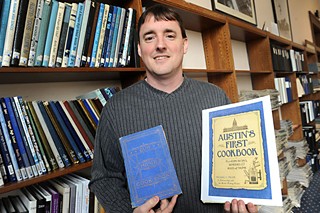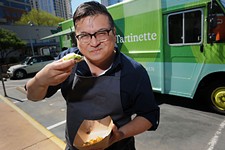Speaking Volumes
The secret history of Austin's First Cookbook
By MM Pack, Fri., March 6, 2015
''Like learning, there is no royal road to cooking. Practical sense and care, with sound and wholesome ingredients only, are necessary."
This could be advice from any contemporary blog or celebrity chef, but this sage observation comes from the late 19th century, in the preface of the very first cookbook to be published in Austin – and only the third to be published in Texas.
In April, Austin Public Library's Austin History Center (AHC) will celebrate a milestone in the city's culinary history: the republishing of this almost-forgotten cookbook put together in 1891 by the women of First Cumberland Presbyterian Church. A small, hardback volume bound in blue cloth, Our Home Cook Book was produced by local printer and bookbinder Eugene von Boeckmann. While we don't know how many copies were printed, only three are known to still exist: the AHC's copy, one at UT-Austin, and one at Texas Woman's University in Denton.
Mike Miller, AHC's director and city archivist, rediscovered the volume in 2013 while putting together the materials for the yearlong exhibit on Austin's food history titled "How to Prepare a Possum." Intrigued by the book's contents, scarcity, and historical value, he contracted with the History Press to publish a new version that includes a facsimile of the original volume, along with related photographs from the AHC collection, two chapters of contextual information by Miller, and a comprehensive bibliography of Austin-centric cookbooks from 1891 to the present. All proceeds from the book's sales will benefit the Austin History Center.
Our Home Cook Book is an apt reflection of the appetites of turn-of-the-century Austin. Railroads arrived by 1871, which meant that residents had access to a wide variety of household equipment and foods, including canned goods and perishables like fresh oysters and European cheeses. Advertisements printed on front and back pages (a common practice of the day) included seven grocery stores, two bakeries, two ice cream shops, two "refrigerated" meat markets, and one candymaker (along with ads for banks, lawyers, milliners, an undertaker, and two bookstores, one claiming 50,000 volumes in stock.) Then, as now, Austinites were well-fed and well-read.
The First Cumberland Presbyterian Church, whose female members published the cookbook, was one of the oldest congregations in Austin. Their original home was a log cabin at the corner of Seventh and Lavaca in 1846, the same year Austin was designated the state's capital. After the Civil War, they built a larger structure on the site, which was replaced in 1892 by an imposing stone sanctuary (pictured in the new book). Based on the dates, it seems a good bet that the 1891 cookbook was a fundraising endeavor to support the building program. This Downtown site was sold in 1956 and the congregation built a new church on Woodrow Avenue in the Brentwood neighborhood, where it remains today.
Sometimes being an archivist and historian means being a detective. One fascinating aspect of this new edition is the biographical information Miller has unearthed about some of the 89 women who contributed the 300 recipes. Fortunately, each recipe was attributed to an individual name. "I was really interested in learning about the people who contributed, who these women were," he says. "It wasn't always easy; unless they were single, they used only their husbands' names and they didn't work outside the home, so often there wasn't much information available."
However, by mining the AHC collections of city records, newspapers, letters, journals, photos, and books, Miller was able to learn something about approximately 20 of the contributors, sometimes with photos, that he includes in the introductory chapter. These women represented something of a cross-section of Austin society at the time; some, like Nancy and Laura Driskill, Alice Littlefield, and Loulie House (whose husband was advisor to Woodrow Wilson), were from prominent local families. The two editors, Medora Thornton and Lucy Davis, were the spouses of a judge and a real estate agent.
Miller also writes about the women who owned AHC's copy of the cookbook. "This was used in at least two women's kitchens," he says. The first associated name is "E. Kreisle," handwritten on the flyleaf along with "1902 Austin Texas" and a recipe. Miller learned quite a bit about Emilie Kreisle (1856-1937). Her father came from Germany in 1846 and owned a house on Trinity Avenue and a furniture store on Congress (for which he bought an ad in the cookbook). Emilie was musical, never married, and spent her whole life in the Trinity house.
The second name in the book is a stamp for "Mrs. Carl Edw. Bock" with an address on Bowman Avenue. This was Caroline Bock, active member of many Austin clubs and organizations in the Fifties and Sixties; her husband played with the Austin Symphony for 30 years. We don't know how the book migrated from Emilie Kreisle to Caroline Bock (perhaps a musical connection?), and there are no clues whether there might have been additional owners. In the library accession records, there's no indication who donated the book to the AHC collection or when.
The collection of recipes (or receipts, as they were called at the time) in Our Home Cook Book is a mixed bag and the variety will remind readers of other community cookbooks. There are sections on meats, fish, soups, breads, and pickles, as well as a section called Household Receipts that covers both home medical remedies and household cleaning tips.
While there are plenty of recipes for everyday fare, fancy, special-occasion dishes abound. As is common in such compilations, there's a preponderance of desserts. Certainly, when the contributors (not all church members) had the opportunity to share kitchen talent, they preferred to offer party pieces rather than ordinary dishes. Thus, almost half the book's recipes are for cakes, pies, cookies, ice creams, and puddings.
It's important to note that many contributors surely had hired help in their kitchen, and these invisible women actually executed the recipes and indeed, were often the sources for them. It seems unlikely that Mrs. Littlefield wrestled with the whole calf's head that begins her complicated recipe for Mock Turtle Soup.
There's a small section titled Mexican Recipes, all contributed by Fanny Chambers Gooch Iglehart. One of the few contributors known to have worked outside home, she was a writer, and spent years living and traveling in Mexico. Her first book, Face to Face With the Mexicans (1887), includes these same recipes, and with a little imagination, modern readers will recognize them; tamal de cazuela, for example, is an interesting take on tamale pie. Unfortunately, but not surprisingly, there are no recipes from the women who lived in the Austin neighborhood known as Mexico, located a few blocks south of the church.
The new edition's final section is a dedicated labor of love that will be an invaluable resource for food writers and anyone interested in Austin's culinary legacy. It includes both a chapter describing Austin cookbook history and a descriptive list of cookbooks – a boggling 476 – that were either written or published in Austin from 1891 to the present. According to Miller, most appeared from the Seventies forward.
As for today's congregation at First Cumberland Presbyterian Church, the existence of the original Our Home Cook Book is a surprise to them. Bill Ambrose, a church elder whose grandfather was pastor there from 1920 to 1927, says, "Although we have not found anyone in our congregation who has ever seen or heard of the 1891 cookbook, we were thrilled to learn that it is being reprinted, and we look forward to having our own copies. The fact that more than 80 women contributed recipes to this cookbook suggests that First Cumberland Presbyterian played a prominent role in Austin at that time."
"We're happy that copies of this book are now available to anyone who wants them," says Miller. "Our original is fragile and can't take much handling. But the recipes and ads and handwritten notes reveal so much about what Austin was cooking and eating at the time. If anyone knows about any of the contributors or about the book, we want to hear about it at the Austin History Center. And who knows? Maybe some additional original copies will turn up."
Austin's First Cookbook: Our Home Recipes, Remedies, and Rules of Thumb (Michael C. Miller, in Partnership with the Austin History Center, American Palate, a Division of the History Press, 208 pp.) will be released on April 13, and will be available at BookPeople and at www.historypress.net. A book release party at the Austin History Center will be held Tuesday, April 14, 6:30pm.









